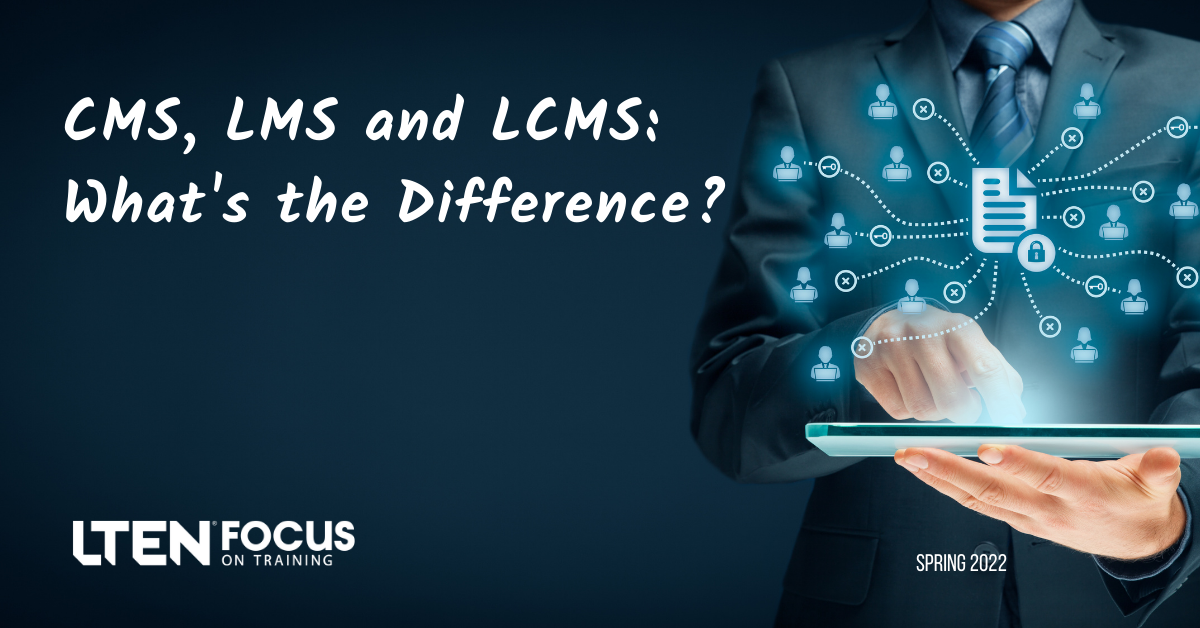
Technology – By Vijayshree Rautela
A look at content and learning technologies and why you need them
 About 20 years ago, Bill Gates coined the phrase, “Content is King.”
About 20 years ago, Bill Gates coined the phrase, “Content is King.”
Today, content continues to reign, even in different comprehensible formats such as learning, videos, audios, presentations, podcasts, etc. The challenge has always been how to reach, use and modify content effectively and seamlessly from a central location for easy accessibility to users in an organization.
Meeting this challenge was the role of content management systems (CMS), learning management systems (LMS) and learning content management systems (LCMS). As the need for different types of digital content in organizations increased over the years, so did the need to establish systems and globally accepted technology standards to manage them.
Let’s look at what CMS, LMS and LCMS technologies are, and why organizations need them.
The LMS
An LMS is a software application that helps to facilitate online self-paced learning by hosting the online training courses at a central location for all in an organization to access, track progress of learners, provide evaluations, access outcome of evaluations, facilitate learning plans based on user roles and much more. It also enables scheduling in-person, virtual or hybrid classes and managing registrations.
These systems have the functionality to track the enrollment and provide the functionality to mark learners as attended for courses and classes. Learners receive their transcripts based on the classes they have taken. These systems also enable varied reports to be generated, based on the tracked learning of different users or roles.
Most frequently, the online courses that are uploaded on an LMS for learning and user training tracking purposes are created using authoring tools outside of the LMS.
LMSs require courses to be compliant with Shareable Content Object Reference Model (SCORM) standards for the system to be able to track the performance and progress of users in those courses. SCORM is a functionality that has globally defined technology standards for web-based training delivered via an LMS.
LMSs are most useful in organizations where employees or students need to be trained in certain skillsets or technologies and their growth can be tracked based on the online training they have taken in these systems. In addition, a lot of learning providers host their content on the LMS and provide them to different organizations at a certain cost to train their employees. This enables organizations to access diverse courses and get their employees trained.
LMSs are most useful in organizations where employees or students need to be
trained in certain skillsets or technologies and their growth can be tracked based
on the online training they have taken in these systems. In addition, a lot of
learning providers host their content on the LMS and provide them to different
organizations at a certain cost to train their employees. This enables organizations
to access diverse courses and get their employees trained.
The CMS
A content management system, on the other hand, is a software application that provides the framework as a central library to store digital content of varying kinds such as Word, PowerPoint, Excel, videos, audio, etc. It also enables multiple users across an organization to view, edit and add additional documents as required, based on their permissions defined in the system.
It establishes a folder structure and auto creates versions as these are edited. It is also an answer to storage and space issues of digital content that can be a challenge for an organization’s shared drives and network.
It does not include the learning functionality of an LMS.
Most universities, schools and other education institutions have CMSs as they enable instructors and students to upload, edit and share content sources, assignments, evaluations and feedback, and to be able to collaborate with each other in the forms of discussion forums and wikis.
The LCMS
An LCMS is an extension of an LMS. It provides the functionality to create learning content using authoring tools, assemble that content, host, deliver and evaluate it from a central location to different users in various formats such as online trackable courses, videos, presentations, podcasts, etc., besides providing tracking, reporting and SCORM compliance that an LMS does.
Integrated content delivery solutions such as LMSs, eportals, LXPs and others are used to deliver the learning content. While an LMS is useful to the learners, an LCMS is useful also to the creators and administrators of the content. Different LCMSs have all (or additional) features that are mentioned here.
Costs & Affordability
Now that we know the differences between an LMS, CMS and LCMS, let’s next look at their costs and affordability. Based upon the budget of organizations, there are free LMS, CMS and LCMS (known as free open source) available.
When using a free open source, an organization may have to configure and install these software systems themselves. When bought from an organization, the configuration support, guidance and customer support may be provided at an additional cost.
Are These Systems Really Necessary?
Any small to large organization, whether having a single location or multiple, may not be able to track and evaluate growth of their employees without an LMS or LCMS. If an organization doesn’t own an LMS, LCMS or a CMS, depending on its
content requirement, it will have to leverage external learning and content storage from organizations or systems.
As technology is advancing at a fast pace, the skillset of employees in an organization needs to be upgraded and sharpened. An organization should be able to track the learning progress of employees for their new and existing roles and responsibilities. Essential organization training like ethics and diversity, security, workplace harassment and others need to have an LMS or LCMS to deliver and track participation.
So, yes, these systems have become essential components for organizations to be able to use content and learning content for their employees and clients effectively. And based on the multitude of content and learning management systems that are now available and will continue to be developed in the future as digital content evolves, we can say, in strategist Lee Odden’s words, “Content isn’t the king, it’s the kingdom.”
Vijayshree Rautela is an instructional design & training specialist. Email her at rautelashree@hotmail.com.








